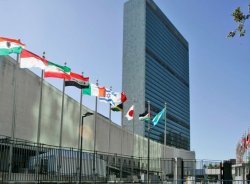
Several countries are now ending legal prohibition of marijuana. Uruguay has already legalized cannabis; Jamaica and Canada are soon to follow. As they do so, they violate restrictive treaties signed with other UN members. At least three UN treaties demand cannabis prohibition worldwide:
- 1961 Single Convention on Narcotic Drugs.
- 1988 Convention Against Illicit Traffic in Narcotic Drugs and Psychotropic Substances
- 1971 Convention on Psychotropic Substances
These treaties, in most part the result of US initiatives and pressure, have been signed by nearly all the planet’s countries. Essentially, they internationalize America’s war on drugs. Supposedly, signatories such as Canada and the US no longer have the sovereign power to change their drug policies. The UN conventions are enthusiastically enforced by UN anti-drug bureaucracies, especially United Nations Office on Drugs and Crime (UNODC). In addition to the UNOCD, the organization sports yet another drug war bureaucracy, the Vienna-based International Narcotics Control Board (INCB), which monitors compliance with the conventions. They call for zero use of cannabis and forbid any production. The conventions encourage countries to punish drug crimes harshly and specifically call for prison time.
The conventions disallow the use and sale of a wide range of natural medicines and entheogens, substances used for religious, shamanic, or spiritual purposes. Potentially beneficial mood drugs such as MMDA, mescaline, and San Pedro Cactus are forbidden. At the same time, the conventions totally ignore the truly dangerous drugs of tobacco cigarettes and alcohol. To be clear, cigarettes kill around six million people yearly; cannabis kills zero, yet UNODC and its conventions demonize cannabis (and even cactus) while giving addictive and deadly cigarettes a free pass.
The UN had the perfect opportunity to interject change and confront new cannabis realities in its recent General Assembly meeting addressing the issue, UNGASS 2016. It did almost nothing, seemingly frozen in place.
Many countries are now moving towards cannabis legalization in spite of UNODC and INCB objections and treaty obligations. This is probably the only way the conventions and UN drug bureaucracies will change, essentially by being ignored.
Uruguay – This small South American country’s legalization came unexpectedly and has been implemented quickly. This legalization was quickly declared by the United Nation’s UNODC as “incompatible with what is stipulated in the 1961 Convention.” Uruguay’s legalization has proceeded unapologetically. Indeed, Uruguayans challenged the UN, and its stifling bureaucracies and treaties. Said Uruguay’s “Drug Czar” Secretary Milton Romani in the PanAm Post, the country’s goal was not to slavishly obey the conventions,
“but rather about upholding the ultimate goals of these treaties, which explicitly say they seek to improve humankind’s health and well-being.”
Jamaica – This island country returns to celebrating the ganga it has so long repressed. Under US and UN domination, Jamaica repressed cannabis along with the islanders who used it. Jamaican Foreign Minister Kamina Johnson-Smith told the UN General Assembly,
Canada – With Justin Trudeau’s ascendency to power in Ottawa, marijuana will soon be legal in Canada. As reported by Catherine Cullen in CBC News, Canada can deal with its upcoming violation of its UN treaties in one of two ways:
On the one hand, Canada could take a “principled stand” in favour of the international legalization of pot.
The other, quieter approach, would be to withdraw from the treaties and attempt to re-enter with a special exemption for legalized marijuana.
Withdrawing from the treaties would be the correct step, but forget about attempting to reenter them. To do so would validate the UN’s bogus scheduling, which includes harmless but useful entheogens as Schedule I drugs, classifying them as highly dangerous with no medical value. It would also legitimize the war on drugs.
Canada should take the principled stand and refuse to kow tow to these cruel and counterproductive conventions, as should all the UN member countries.
US States -American voters have legalized medical marijuana in half of American states, and given the go ahead for full adult use in several other of the United States. The UN bureaucracies are unhappy about such American freedoms. Yury Fedotov, executive director of the United Nations Office on Drugs and Crime (UNODC), was quoted by Reuters,
“I don’t see how (the new laws) can be compatible with existing conventions.”
The UN’s oppressive drug policies, bureaucracies, and conventions must end. Long past due is the day when the UN needs to promote humanitarian and harm-reduction policies, not foisting off more failed, harm-maximization drug war policies on the countries and people of the world.
Voter-mandated legalizations in American states, and cannabis prohibitions falling in countries around the globe may yet force real harm-reduction change at the United Nations.






